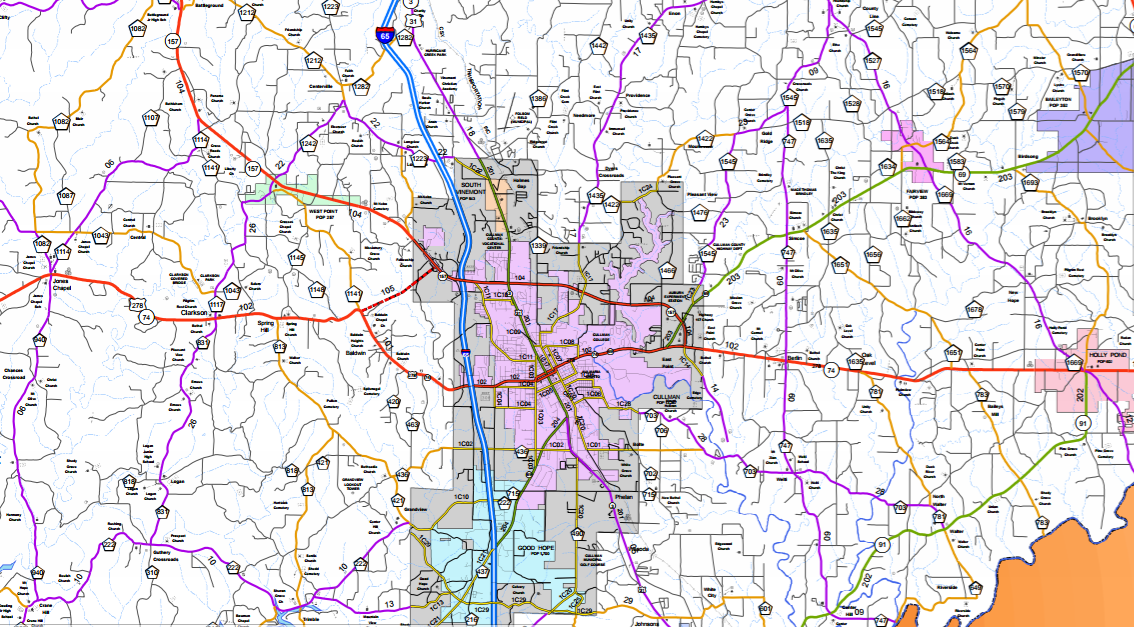Cullman County has 2,393 miles of roads, more than 1,500 of which are maintained by the Cullman County Road Department.
CULLMAN – A while back, The Tribune invited its readers to sound off about county roads in need of repair or repaving. The roads reported included County Roads 4, 6, 15, 18, 19, 54, 59, 68, 71, 109, 134, 223*, 248, 258, 276, 370, 395, 418, 501, 550, 551, 601, 702, 730, 771, 813*, 818, 831, 855, 1043, 1082, 1087, 1107, 1155, 1174, 1193, 1218, 1255, 1258, 1286, 1288, 1296, 1386, 1422, 1428, 1442, 1455, 1485*, 1486, 1490, 1616 and 1625.
(* denotes roads that received substantial attention from multiple commenters)
Not included in this list are several roads and road issues about which readers offered numerous comments, including the concrete barriers on U.S. Highway 278, the narrowed portion of the same road between Lowry’s Station and East Point, conditions on I-65, and seemingly stalled projects on U.S. Highway 31 and Alabama Highway 157. These four roads fall under state and/or federal jurisdiction through the Alabama Department of Transportation (ALDOT), and neither Cullman County nor the City of Cullman have any jurisdiction over them. At the end of this article are links to ALDOT pages listing north Alabama projects, including a plan for “additional lanes and bridges from SR-69 to east of SR-3” with “bridges over Lake Catoma and CSX Railroad” on Hwy. 157, scheduled for fiscal year 2019.
Among the comments in the thread on The Tribune’s Facebook page, Cullman County Commissioner Garry Marchman took time to communicate with a few of the commenters, and stated, “I am appalled and embarrassed at the condition of many of our county roads. I have worked tirelessly to create a plan that would improve what we do. I cannot fix every problem with the resources we currently provide, but hope we can work together to improve our situations. I will find out why the problems you identified have not been addressed or if they have been addressed what efforts we made to improve the situations. I apologize if I have overlooked your situation for some reason. Every road and every citizen is important to me, and I will do my very best to work towards improving our situations.”
By the numbers
Understanding a few facts about the road system of Cullman County may help Tribune readers better understand the tasks and work of the Cullman County Road Department.
- Cullman County has 2,393 miles of paved roads, second only to Jefferson County in raw mileage. Of these miles, ALDOT maintains 187 miles (Highways 31, 69, 91, 278, 157; and I-65) and 643 miles are maintained by municipalities and private entities.
- The Cullman County Road Department maintains 1,563 miles of roads in unincorporated parts of the county, surpassing even Jefferson County in that respect.
- Though Cullman County is second in raw road mileage and first in county-maintained mileage, it is 17th in line for distribution of fuel tax revenues from the State. Those revenues are not distributed according to mileage, but primarily by population, and each county’s revenue goes into the big pot for distribution. In other words, buying gas in a certain county does not mean that all of the fuel tax you pay goes to that county. (It’s important to note that the Cullman County Road Department is responsible for non-incorporated areas; roads inside municipalities are the responsibility of those municipalities, except for state roads.)
- The cheapest form of paving, chip-seal, costs more than $30,000 per mile to apply. At the other end, the asphalt paving recommended for heavily used roads averages $102,000 per mile.
- At that high end and with no unforeseen extra expenses, the repaving of all county-maintained road mileage would cost $159,426,000. Even at the low end, the cost would well exceed $46 million.
- The Cullman County Road Department’s 2018 budget is $8,157,276. The largest portion of that, as with most local government agencies, goes to employee expenses; with utilities, facilities, and equipment costs taking their slices of the pie as well. Road paving and maintenance gets $1,436,631.
On Wednesday, The Tribune sat down with Marchman, fellow Commissioner Kerry Watson, and Commission Chairman Kenneth Walker, along with County Engineer John Lang, to talk about what the County Road Department is doing.
Lang began, “We have a grossly underfunded road department. I’m not going to sit here and tell you that there’s no waste in the road department; that would not be true. Whenever you have an entity as large as what we’ve got, you’re going to encounter some waste, and we’re no exception. We’re taking strides to make the amount of waste smaller; we’re doing what we can within the bounds of the law and good prudence to reduce waste.
“We’ve taken several actions. We’re trying to keep overhead down by reducing staff gradually, through attrition. We’ve looked into alternative methods of pavement preservation, and of machinery that we’re able to do more with less, because that’s the direction we’re heading. We expanded our toolbox to enable us to use all these developing technologies in order to reduce the waste, so there’s that aspect of things. We’re doing what we can to try and make it better.
“The other side of the coin, of course, are the resources. I told Garry this morning: if we took every dollar in our budget, and we didn’t do any maintenance, we had no employees and no maintenance, and all we did was pave roads with it, by the time we got done, it would be time for us to start over again. And that would be to start over again on the roads that hadn’t washed out due to drainage issues or that were overgrown with foliage.
“The key issue is resources, and the resources don’t match the need. You can pretty much throw a dart at a map of Cullman County and draw a circle around it, and you’re going to hit a whole bunch of bad roads. We are aware of that.”
Historical road structure weaknesses
Walker said, “I remember as a kid, seeing motor graders ditching roads, and just throwing it up in the middle of the road, and just letting it run off, and just putting tar and gravel down. Our problem is the base of our roads: we’ve never had a base.
“So John, when he came in as our engineer, we started, if we paved a road, we’d go all the way down to the base and rebuild it, do it the correct way that wasn’t done before. And it costs us more money to do it, but we’ve tried to do it the right way the first time.”
“One thing I try to tell people,” added Marchman, “this is something that’s been created with bad management over the years. I don’t care to say that, but that’s exactly what happened. We had people in here that didn’t manage the road system the way it should have been managed, that didn’t fix roads the way they should have been fixed, that didn’t put money where it needed to be put.
“This is a problem that can be fixed. It can be fixed. There’s no problem that can’t be fixed, but there’s not easy answers to it. If you fix one problem, then you’ve got to let another area go, to fix that problem with the resources we have.
“That’s the way our society is: they want it done now, they want it done today. And this can’t be done in a two-year stretch or a three-year stretch, or a four-year stretch. This has got to be long-term planning. It’s got to be seen all the way through, because if you don’t, you’re going to be right back where you was at.”
Establishing priorities and maintaining accountability
Said Watson, “This is a situation that’s been political for so long, and we’ve come in and we’ve tried to right the ship in the right way to do it, to take the politics out of it. We have district supervisors that are out there, that work the roads every day. They know the ones they get the most complaints on. They do a list; they get with John, they look it over with the engineer. When they get to the point that it’s time for us to step in, they present them to us and we sign off on it.
“I think that’s helped a lot, because that keeps everybody from just going out here and paving whoever’s road. We try to hit the roads that are the most needed. The people with their feet on the ground who are working out there every day, they’re the ones that kind of know.”
Marchman has created a database of all county roads to keep track of road statistics and conditions, along with the dates and types of work done on each road. A new engineering database program being developed will allow the road department to track what is being done to each road and even view recent video of each road, to monitor how repairs are holding up. According to Lang, each call that comes in to the road department is now logged and the information recorded. The goal, according to the commissioners and engineer, is to create a mechanism of accountability, to make sure that residents’ concerns are addressed and that problems are resolved fairly and in as timely a manner as resources will allow.
“Something that we used to hear in the past a lot,” said Lang, “is that people weren’t getting callbacks; that’s something that we really stressed. That’s why we keep good records, so that there’s accountability from the top to the bottom, where if somebody calls into the office and issues a complaint, and we either take an action or follow up with the person within three business days. That’s our internal policy, and we’ve been pretty effective at that. And the days of where you’d hear ‘I called and nobody ever called me, and nothing got done’–I’m not going to say that never happens anymore, but it’s way less and it’s not something we accept.”
Marchman said, “When I look at the priorities that have been turned in on road numbers, that’s one of the things I go back to: how long it is, how many residents is on it, what’s the traffic count on it. If you combine all those numbers, then you know that you’re making the biggest impact on wherever you spend your money.
“Now, does a road with two houses on it need paving? Of course it does. Is it a priority? Of course it is, but not as much of a priority as this road that has 200 houses on it. How do you set your priorities and let people understand? Because the problem that they have is the problem with the pothole in front of their house. They’re not worrying about somebody that lives in Arkadelphia or Bremen, or anywhere else. All they’re worried about is the pothole that’s in front of their house.”
Several factors go into the decision-making process in determining priorities for road maintenance and repair:
- Truly dangerous road conditions receive immediate response. The officials differentiated between conditions that require response (trees or debris in the road, lanes washed out or frozen over, etc.) and complaints about what a particular road does to the vehicle of a person known to drive their vehicle at excessively high speeds on that road.
- Roads that have more residences may have to take priority over those that are sparsely populated. Commissioners insisted that serving all the people is important, but that the department has to prioritize in order to do the most good for the most people with the resources available.
- Roads that are more heavily traveled, especially those that impact the local economy, have to receive attention with regularity. Roads known in state parlance as “major collectors,” those that provide easy thoroughfares for farmers transporting produce and livestock, evacuation or emergency access routes in times of disaster, and routes to economic staples like Smith Lake or local industries, may get repaired and repaved more often than others because of federal funding earmarked especially for such roads; those funds cannot be diverted even to more pressing needs. Cullman County’s major collectors include all or portions of County Roads 8, 35, 91, 222, 703, 747, 831, 940, 1043, 1082, 1101, 1114, 1117, 1223, 1242, 1435, 1527, 1545, 1669, and possibly others.
Proposed gasoline and diesel fuel tax
The County budget currently allots $1,436,631 for road paving and maintenance. Using budget money and grant funds, the road department resurfaced 32 miles of roads in FY 2017 at a cost of approximately $2.6 million.
The Cullman County Mayors and Commissioners Association recently gave its support to a state bill that would call on Cullman County residents to vote on a 3-cent increase on gasoline tax and a new 4-cent diesel fuel tax that would be dedicated to the purchase of materials for road repaving and repair. In the proposed form of the bill, no generated revenue would go to road department salaries or administrative expenses.
If passed, the tax is anticipated to generate approximately $1.5 million annually, doubling the road department’s pre-grant repaving and maintenance budget.
“It would help,” said Marchman, “It would be an impact.”
According to Lang, by purchasing its own asphalt with extra funds dedicated to materials, and not having to outsource, the per-mile repaving cost could be significantly reduced from $102,000 to around $70,000.
“If you’re talking about doing 800 tons a day,” said Lang, “you can save $20,000 a day. It’s significant.”
Marchman added, “You don’t think it’s that much, but we could add another 5 or 6 miles per district. (The county is divided into four districts.) Even if we hit it just right, maybe even 10 miles in each district.”
It comes down, though, to whether or not the voters of Cullman County will support a tax, and whether or not they have confidence in the people who will spend that tax money.
“I think when you mention tax,” said Watson, “they automatically go off.”
“It’s automatic,” agreed Marchman. “That’s the consensus I get, you know: ‘We don’t want to give you any more money to mismanage.’”
Lang added, “That’s one of the reasons I think it’s important to differentiate who we are, to let everyone know that we are not the (Alabama) Department of Transportation. Because you go up and down 278 and see concrete barriers, and think, ‘What are these people thinking?’ Here in Cullman, it has been grossly unpopular, and we want everybody to know that the Cullman County Road Department has absolutely nothing to do with the safety enhancements on 278. Some of the things that people attribute to mismanagement aren’t housed in the commission office.”
The final word
At the close of our protracted discussion, Marchman stated, “I want y’all to know, and I want everybody to know, that I’m doing everything that I can to be as transparent as I can, and to make everything that I can out of what we’ve got.”
Watson shared, “Something I always brag about is the staff we have. I mean we’ve got really good department heads here. We made some changes when we came in, but nothing major, just a few. But we have some people who care about what they’re doing. I know sometimes it don’t come across to the public that way, but most of our people really care about the county, about what they do–take pride in what they do, from the road department to sanitation. Those guys have a tough job, and they actually take pride in what they do, and they do a very good job. They make the county look good for what they do.”
Lang added, “You talk about people who take pride in their job; one in particular that comes to mind is Lightning (Ronald D. “Lightning” Park) out on the west side. That is a great example of someone who goes above and beyond, and does what he needs to do with pride, takes care to do it right. And he has one of the worst jobs around; nobody else wants to do it. He walks behind a dirt patching truck whenever the weather is suitable, and sometimes when it’s certainly less than desirable, and he really goes 110 percent and gives every extra effort he can, and does a great job. We move him across the county sometimes, just because if we have an area that’s trouble, we know if we send him out there we’re going to get an A-plus job. And he really takes a lot of pride in what he does. It’s people like him that we really appreciate.”
Lang invited citizens with concerns about roads to contact the County Road Department at 256-796-2266. After-hours calls go through the Cullman County Sheriff’s Office dispatch office, which has a list of road department personnel on call.
For a listing of current ALDOT projects in the Cullman area, visit https://cpmsapps.dot.state.al.us/OfficeEngineer/Plan/NorthRegion and https://cpmsapps.dot.state.al.us/OfficeEngineer/ProjectReports/StipRpts/Hwy/NORTH_Hwy.pdf.
Copyright 2018 Humble Roots, LLC. All Rights Reserved.



















